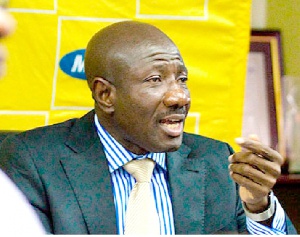Mobile network operator MTN Ghana has paid GH¢675.6 million as taxes to government last year, Mr Ebenezer Asante, Chief Executive Officer of MTN Ghana, has said.
He said the amount is GH¢70.6 million more than it paid in 2014.
The company posted a strong revenue performance last year, raking in about GH¢2.32 billion in a year.
The revenue performance of MTN represents a 15.9% increase over the 2014 figure of GH¢1.99 billion and was supported strongly by its data services, which contributed 30.6% to the company’s total revenue.
Mr Asante stated that MTN has set aside $96 million investment for 2015.
Giving a breakdown of the investment figure, he said $62 million had been allocated for infrastructure development, $16 for Information Technology and $18 million for the rollout of the newly acquired LTE.
On MTN’s financial performance for 2015, Mr Asante said the results were by far very good, with all segments of the business contributing to the growth.
He said the company was able to diversify its revenue stream from voice and data with enterprise and mobile money, making substantial contribution to revenue growth.
Mr Asante said MTN’s open market partnership being implemented with most handset dealers allowed subscribers who purchase handsets to be immediately hooked to data subscription and helped move the data growth upwards.
He said the company expected robust growth in 2016, but warned that the growth was likely to taper off going into 2017.
Mr Asante said consolidation would be a key driver of the telecommunication industry in the future, adding that a market of about 30 million was too small for six major players.
“We see a lot of partnership in the future,” he said, adding the LTE would not be different.
He said MTN would also focus on improving communication in the rural areas in the next few years in partnership with the Ghana Investment Fund for Electronic Communications.
On the 4G network, Mr Asante said MTN was committed to full deployment by the middle of the year.
MTN, currently the biggest mobile network operator in Ghana, controls 46 percent of the mobile phone subscriber market --- with total voice subscriptions totalling a little above 16.25 million as of the end of December last year.
MTN’s performance in the data market recorded 8.634 million subscriptions, which makes up 47.8 percent of the entire data market share, as revenue from data services increased by 85.2 percent last year.
MTN bought the 2x10MHz spectrum with the 800MHz for US$67.5 million and finished paying in January this year.
There are three 4G LTE service providers in the country who are only operating in the Greater Accra Region, but MTN Ghana has so far deployed 4G cell sites and other infrastructure in at least four regions pending the commercial launch of the service later this year.
The telecoms giant has deployed 27 4G cell sites in Greater Accra, 23 in Kumasi, eight in Sekondi/Takoradi, nine in the mines area (Tarkwa and Obuasi), and one each in Koforidua and the Ashesi University.
According to him, when the service is deployed, its availability will be similar to how the 3G and 2G have interplayed so far, where the customer gets 2G, 3G and now 4G on their phone, depending on where the service is available.
He noted that the experience 4G offers is a multiple-time better than 3G, illustrating that where 3G is running 2,000kmps while 4G will go 100,000kmps.
"In effect, if it takes a 3G network two hours to download a high definition video, it will take only 15 mins to download the same video with a 4G LTE network," he said.
Asante foresees three major areas of benefit that a nationwide 4G availability could bring to Ghana; namely, economic growth, innovative service and social impact.
He also believes 4G will facilitate e-health services and even remote surgeries, where a specialist may not be at the location of the procedure but be able to direct another surgeon to conduct a successful surgery just by watching it on a crystal-clear video produced on a 4G network.
MTN was the only existing telecom operator to have bided for one of the 4G spectra bands within the 800MGHz spectrum put on sale by the National Communications Authority last December.
Business News of Monday, 14 March 2016
Source: thefinderonline.com













